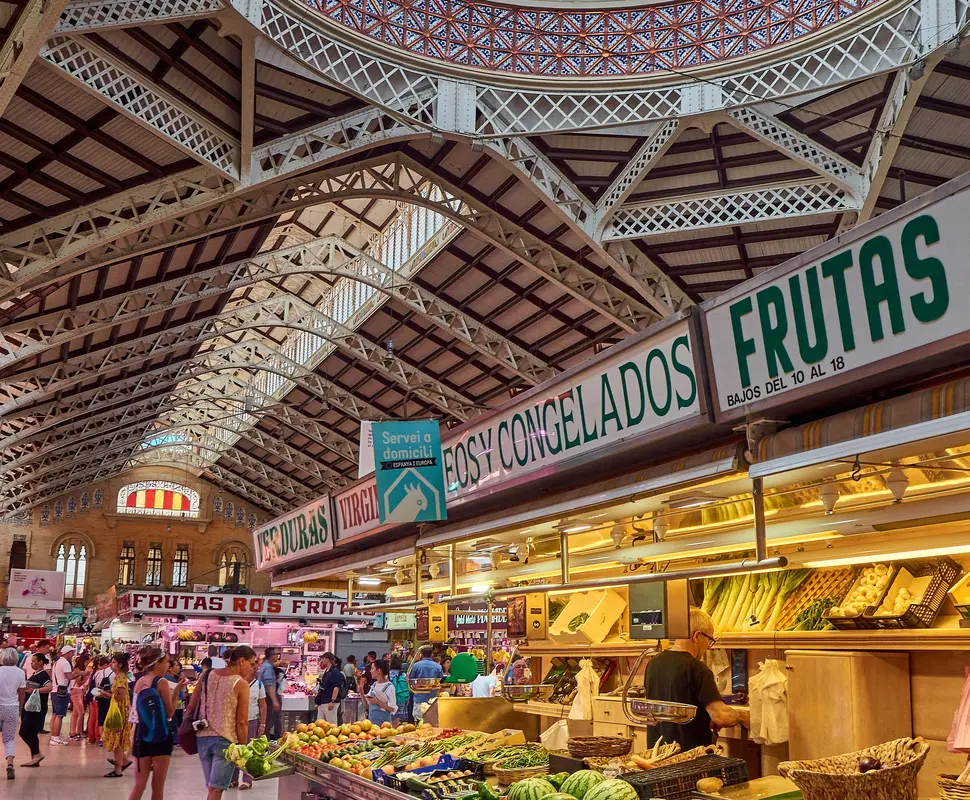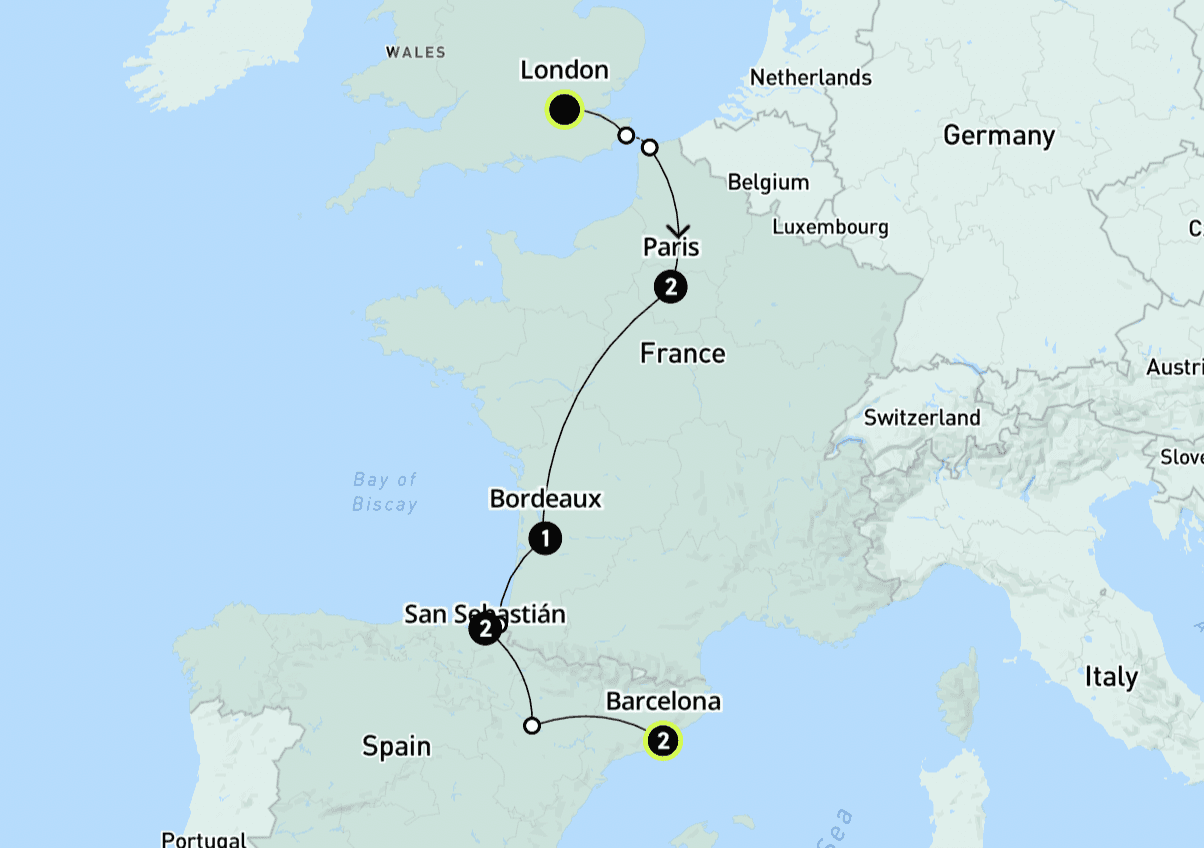Planning a trip to Spain? Don’t let the language barrier hold you back!
Imagine confidently ordering tapas, asking for directions, or even making new friends—all with just a few key phrases.
In this blog, 17 Key Spanish Phrases [You’ll Actually Use], I’ll show you the exact expressions that will make your travels smoother and more enjoyable.
From casual conversations to practical situations, these phrases have been tried and tested by travelers like you.
Ready to impress locals and navigate like a pro?
Keep reading to unlock the language tips that will take your Spanish adventure to the next level!

Let’s be honest—you and I both know that when nature calls, it doesn’t care where we are. Have you ever found yourself wandering around, desperately scanning for a bathroom but too shy to ask? In Spain, you’ll likely hear the word “baño” (bathroom) or “aseos” (restrooms) depending on where you are. This simple phrase could save you a lot of unnecessary stress, whether you’re at a bustling tapas bar or strolling through a charming plaza. Trust me, learning this one is a game-changer—you’ll thank yourself later!
2. How much does this cost? – ¿Cuánto cuesta (esto)?
Imagine this: You’re browsing a vibrant Spanish market, captivated by colorful ceramics, handmade fans, or maybe even a delicious-looking churro. But then it hits you—you don’t know how to ask the price! I’ve been there, standing awkwardly, hoping the vendor speaks English. This phrase, “¿Cuánto cuesta esto?” (How much does this cost?), instantly bridges that gap. Plus, you’ll feel a sense of accomplishment when they reply in Spanish, even if you only catch part of it. Go ahead, try it out—you might even score a deal while practicing your Spanish skills!
Want to travel smarter? Discover key tips and strategies in our Expert Opinions on Travel Challenges to handle any situation on the road.
3. Do you speak English? – ¿Habla inglés?
You might wonder, "Should I just assume everyone speaks English?" Well, let me tell you—it’s always polite to ask first. Starting with “¿Habla inglés?” shows respect and opens the door for a smoother conversation. I’ve learned that even if the answer is “no,” Spaniards are incredibly patient and will try to help, whether with hand gestures, a big smile, or even writing things down. You’d be surprised how much connection can happen, even when words fail. Why not give it a try? You might end up learning more Spanish than you expected!
4. How do I get to [landmark/place]? – ¿Cómo llego a [lugar]?
You’re standing in the middle of Madrid, excited to see the Royal Palace but unsure how to get there. Sound familiar? I’ve been in your shoes, staring at maps and feeling a little lost. That’s when this phrase becomes your best friend. “¿Cómo llego a [lugar]?” not only gets you directions but often leads to helpful tips like the best metro stop or a scenic walking route. And don’t worry if their answer feels like rapid-fire Spanish—just smile, nod, and thank them with a cheerful “¡Gracias!” You’re officially blending in as a traveler, not a tourist.
5. Is it possible to pay by card/cash? – ¿(Es posible pagar) con tarjeta/efectivo?
Have you ever had that awkward moment at the register, unsure whether to pull out your card or dig for cash? In Spain, especially in small towns or markets, it’s worth asking, “¿Es posible pagar con tarjeta?” (Can I pay by card?). I’ve found that while most places now take cards, some prefer “efectivo” (cash), especially for smaller purchases. It’s a small phrase, but it saves you from any confusion. Plus, knowing it makes you feel prepared and in control, like you’ve got this whole travel thing figured out.
If you're considering a move, read our guide on the UK expat experience in Spain for insights on lifestyle, culture, and more.
6. Where can I find a taxi/train station? – ¿Dónde (puedo encontrar) un taxi/estación de tren?
It’s late, you’re tired, and all you want is to find your way back to your hotel. Sound familiar? I’ve been there, and that’s why I love this phrase. Whether it’s a taxi after a long night or directions to the nearest train station, “¿Dónde puedo encontrar un taxi/estación de tren?” is a lifesaver. I remember the first time I used it—a kind stranger not only pointed me in the right direction but also gave me tips on the best routes to take. Try it; you might just have your own little adventure!
7. Could I have the bill, please? – ¿(Me puede dar) la cuenta, por favor?
Picture this: You’ve just had an amazing meal, maybe some savory tapas or a creamy tarta de queso, and now you’re ready to head out. But in Spain, the waiter doesn’t automatically bring the bill—you have to ask for it! That’s where this phrase, “¿Me puede dar la cuenta, por favor?” (Could I have the bill, please?), comes in. I’ve used it countless times, and it always feels polite and effortless. The best part? Saying it in Spanish shows that you’re embracing the culture. Trust me, it makes the whole dining experience even more memorable.
From historical facts to travel tips, our Spain Facts & Travel Guide is your go-to resource for planning a smooth trip.
8. Do you have Wi-Fi here? What’s the password? – ¿Hay Wi-Fi aquí? ¿Cuál es la contraseña?
Let’s face it—you and I both rely on Wi-Fi more than we’d like to admit, especially when traveling. Whether you’re checking maps, posting photos, or texting home, this phrase is your go-to. “¿Hay Wi-Fi aquí?” (Is there Wi-Fi here?) followed by “¿Cuál es la contraseña?” (What’s the password?) will quickly get you connected. I’ve found that most cafés and restaurants in Spain are happy to share their Wi-Fi, often written on receipts or chalkboards. Pro tip: Save it in your phone, so you don’t have to ask twice. Simple, right?
9. Can you help me? – ¿Puede ayudarme?
Ever felt completely stuck, like you have no idea what to do next? I sure have—once while trying to figure out a confusing train schedule in Barcelona. “¿Puede ayudarme?” (Can you help me?) is one of those phrases that opens doors. Spaniards are generally kind and eager to assist, especially if you’re polite. Whether you’re lost, need advice, or just want to clarify something, this phrase instantly breaks down barriers. Don’t hesitate to use it—it’s amazing how much people are willing to help when you ask!
10. Do you have a table for [x]? – ¿Tienen una mesa para [x]?
I can’t tell you how many times I’ve wandered into a packed restaurant, unsure how to ask for a table. This phrase, “¿Tienen una mesa para [x]?” (Do you have a table for [x]?), is a lifesaver. It’s simple, direct, and makes you sound like a seasoned traveler. Whether you’re dining solo or with a group, swapping in the number of people (like “dos” for two) is all you need. I’ve found that using this phrase often gets you a friendly smile, even if the place is busy. Go ahead, try it—you’ll feel like a local in no time.
11. Can you recommend a good restaurant nearby? – ¿Puede recomendarme un buen restaurante cerca de aquí?
Picture this: You’re in a small Spanish town, stomach growling, surrounded by what looks like a hundred different cafés and restaurants. How do you choose? I’ve found that asking a local with this phrase—“¿Puede recomendarme un buen restaurante cerca de aquí?”—is the key to unlocking authentic, mouthwatering experiences. Whether it’s a hidden gem serving crispy croquetas or a family-owned spot with the best paella you’ve ever had, locals know best. And trust me, they’ll love that you’re asking in Spanish! You’ll walk away not only full but also feeling like a travel pro.
12. What’s happening? – ¿Qué pasa?
Here’s a fun one! “¿Qué pasa?” (What’s happening?) is more than just a question—it’s a way to spark conversation and connect with people. I’ve used it at festivals, in bars, and even at casual gatherings to break the ice. It’s perfect for asking about current events, nearby activities, or just getting to know someone. Think of it as the Spanish equivalent of “What’s up?”—super versatile and easy to remember. Why not use it during your next adventure? You might discover something exciting you wouldn’t have known otherwise!
13. What’s your number/WhatsApp/Instagram? – ¿Cuál es tu número/WhatsApp/Instagram?
You’ve met someone interesting—a local or maybe another traveler—and you want to stay in touch. This phrase, “¿Cuál es tu número/WhatsApp/Instagram?” (What’s your number/WhatsApp/Instagram?), is your ticket to keeping the conversation going. I love how casual yet effective it is. In Spain, WhatsApp is incredibly popular, so don’t be shy about using this. It’s not just practical—it’s also a great way to make genuine connections while exploring. Who knows? You might walk away with a new friend or even a travel buddy!
14. Where are you from? – ¿De dónde eres?
I’ve always found this question to be a wonderful conversation starter. “¿De dónde eres?” (Where are you from?) shows curiosity and interest in someone’s background. I’ve asked this in cafés, hostels, and even on train rides, and it always sparks friendly conversations. It’s also a great way to share where you’re from, creating a cultural exchange. Spaniards love to talk about their hometowns, and asking this question can lead to fascinating stories and tips about places you might not find in a guidebook. Give it a try—you’ll be surprised by the connections you make.
15. Can I have a beer/coffee, please? – ¿Me puede dar una cerveza/café, por favor?
Picture this: You’re sitting at a sunny terrace in Spain, craving a cold beer or a strong coffee. This phrase, “¿Me puede dar una cerveza/café, por favor?” (Can I have a beer/coffee, please?), is all you need to enjoy the moment. I love how simple yet polite it is. Spaniards appreciate good manners, and this phrase will make your order smoother and more pleasant. Plus, it’s a great opportunity to practice your Spanish in a low-pressure situation. Trust me, there’s nothing better than sipping on your drink and feeling like you belong.
16. Would you like a drink? – ¿Quieres tomar algo?
This phrase, “¿Quieres tomar algo?” (Would you like a drink?), is perfect for inviting someone to share a moment with you. Whether you’ve just made a new friend or are sparking a conversation with a local, this question is warm, friendly, and inclusive. I’ve used it to invite others for a casual coffee, a drink at a bar, or even just water during a hot day. It’s an easy way to build connections and make your travels more social. So go ahead, ask—you might just make someone’s day and your trip even more memorable!
17. Excuse me / I’m sorry – Disculpe / Perdón
Here’s a phrase you’ll use more than you think, whether you’re squeezing through a crowded market or accidentally bumping into someone on a narrow street. Disculpe (excuse me) and Perdón (I’m sorry) are your go-to words for being polite in Spanish.
Imagine you’re trying to get someone’s attention—maybe you need to ask for directions or inquire about a product in a shop. A polite “Disculpe” will make your request much more approachable. On the other hand, “Perdón” is perfect for those little oops moments, like accidentally stepping on someone’s foot or knocking over a bottle of olive oil (yep, been there).
These words are small but mighty when it comes to making a good impression. A simple “Perdón” can turn a potential awkward moment into a shared laugh, and a well-placed “Disculpe” can open doors—literally and figuratively. So don’t be shy—embrace your inner polite traveler!
Final Thoughts
Learning a few key Spanish phrases can truly transform your travel experience in Spain.
From navigating cities to connecting with locals, these expressions aren’t just practical—they’re your gateway to a deeper, more authentic adventure.
Imagine confidently ordering tapas, making new friends, or simply saying "nos vemos" as you embrace the Spanish way of life.
It’s all about small efforts leading to big moments.
Ready to take your trip to the next level? Bookmark these phrases, practice them, and let the language enhance your journey.
And don’t stop here—keep exploring, keep learning, and most importantly, keep speaking Spanish. ¡Buen viaje!
FAQS Travel to Paradiso
Recent Posts
















